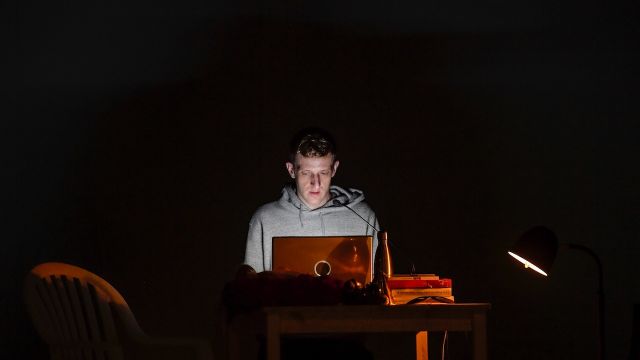Qui a tué mon père
As the audience files into the Dunstan Playhouse, we find writer and philosopher Édouard Louis seated at a desk, typing on a laptop. The cyclorama behind him produced by Sébastien Dupouey and Marie Sanchez, transforms into a never-ending road, subtly lit, indicating that we are on a journey - initially, a clouded and foggy one, which eventually clears as the turmoil of this talented performer come to a crescendo. The stage design by Nina Wetzel is uncomplicated and uncluttered and the lighting design by Erich Schneide creates a sad and reflective feel to enhance the memories from a dark time in Édouard Louis’ life. Spoken mostly in French, apart from a small diversion in English, to retell a sad anecdote about his brother, the performance is accessible due to surtitles on the rear screen.
Édouard Louis begins with a quote from one of the various microphones around the stage, from theorist Ruth Gilmore. “Racism is the exposure of certain populations to premature death. The same definition holds regarding male privilege, to hatred of homosexuality or trans people, to domination by class – to social and political oppression of all kinds.” This sets the scene for a 90-minute exposé on Louis childhood and interestingly, his thoughts on the impact of the policies French presidents that have contributed to his father’s deterioration in later life.

The narrative is non-chronological, which created some confusion at times for this reviewer - the aim of this perhaps to show the fragmented and confused life that Louis led.
We begin with a visit to his father, imagined in a solid chair stage right. Édouard’s father is physically tortured, obese, diabetic and unable to walk. He is barely able to breathe. Louis comments, of THIS man, this shell of a human being, that he spent his whole childhood longing for his absence, praying that his car wasn’t there whenever he returned home. The catch cry from his father of “don’t be a girl, don’t be a faggot” dominated Louis’ life and he was constantly bullied in a toxic, homophobic environment. Louis discusses the masculine ethos of the place where he grew up, how school promoted this and how his sexuality was despised and abhorred.

We see through his riveting narration, however, that this current iteration of his father, was not always who this man was. Through Louis’ mother’s voice-memory we hear of a man who was initially loving and romantic, a man whom Louis sees at one stage in a photograph dressed in a feminine way as a Majorette. This small window into his father’s life raises questions about his own issues with sexuality. Was he forced by society to hold down his own desires and thus transfer his anger and frustration to his son?
The lighter moments of the monologue come as Louis remembers dancing in his bedroom to Aqua - suddenly bursting into lip-syncing “I’m a Barbie girl” - which is fun, but dripping with pathos. Later he tells us of his 8th birthday where confesses his adoration of “The Bodyguard” movie to his father and requests the video for his birthday. Initially his father recoils at this, suggesting more masculine gift ideas, but later reneges buying him the movie. Louis describes playing it continuously and then fills the stage with dance moves to “I Will Always Love You”. These are performed more and more vigorously to his father’s chair – begging for his approval.

Throughout the piece we hear constantly of the abuse from his father, but Louis makes it obvious he still loves him, by harping back to happier times. It is, however, Louis’ sexual identity and the conflict it caused between his mother and father that ultimately cause their marriage to break down.
The final part of the performance is very Brechtian in style, shocking us as he begins on an indictment of the politicians he names and shames for his father’s current situation. A hideous accident at the factory where his father worked caused an injury leaving him physically disabled.

Louis creates a ‘wall of shame’ with objects hung on display, hauntingly reminiscent of pikes after the executions during the revolution. Each represents the four presidents - Jacques Chirac, Nicolas Sarkozy and François Hollande and Emmanuel Macron. He blames their policies for destroying workers’ rights and access to health care and further crushing not only his father’s back. Louis ‘executes’ each policy and destructive idea after each symbol is hung, in a burst of ‘gunfire’ from crackers. Whilst a satisfying resolution it still leaves us saddened at the loss of his relationship with his father.
Throughout this sombre piece, we feel Édouard Louis’ sadness at what could have been, and his anger at the ‘system’ and his perceived ‘humiliation by the ruling classes’.
Qui a tué mon père is a powerful piece of theatre.
Shelley Hampton
Photographer: Roy VanDerVegt
Click here to check out our other Adelaide Festival 2024 reviews.
Subscribe to our E-Newsletter, buy our latest print edition or find a Performing Arts book at Book Nook.

